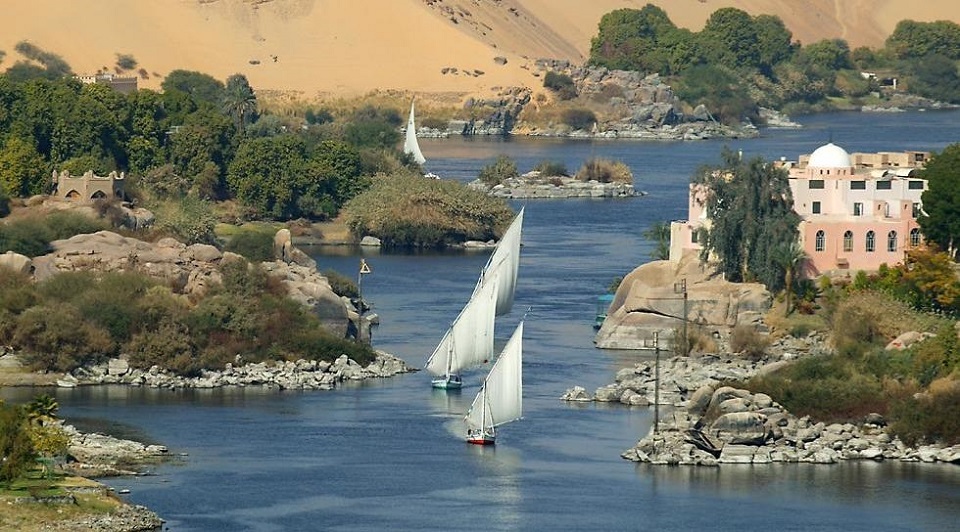
The water resources of the Nile, here at Aswan in Egypt, is a source of both close cooperation and contention for the Nile countries.
Swizeen Ndyabawe
The Nile Basin Initiative is a regional intergovernmental partnership comprising of 10-member states, namely Burundi, DR Congo, Egypt, Ethiopia, Kenya, Rwanda, South Sudan, The Sudan, Tanzania and Uganda. Eritrea participates in this partnership as an observer. It was established in 1999 as a transitional institution to promote cooperative management and development of the Nile Basin shared water resources. The aim was to bring about socio-economic development, and to promote peace and security by minimizing water resource based conflicts. This would be achieved by being the basis for Cooperative Framework Agreement (CFA) negotiations, which were finalized in 2010. The final aim is the establishment of a permanent institution, The Nile Basin Commission.
Enabling environment
The Nile Council of Ministers which comprises of ministers in charge of water affairs from each of the NBI Member States is the highest decision and policy-making body. The institution depends mainly on resources contributed by member states and donations and grants from bilateral engagements with different donors. However the failure by members to pay their contributions and accumulation of country contribution arrears has hindered the operations of the institution and coupled with the challenge of donors cutting their donations which have been facilitating some of the activities.
Nile Basin Initiative has two complementary programs, namely the Shared Vision Progress and the Subsidiary Action Programs. The first aims at creating an enabling environment for cooperation and development in the Nile basin through a number of basin wide activities which include the negotiations for the Cooperative Framework Agreement. This agreement will give legal mandate to a permanent institution that will replace the Nile Basin Initiative.
The Subsidiary Action Programs aim at translating the shared vision into action, these comprise sub –basin arrangements which include the Eastern Nile Subsidiary Action program (ENSAP) with Egypt , Ethiopia, South Sudan and Sudan as members and the Nile Equatorial Lakes subsidiary Action Program (NELSAP) which includes Burundi, Democratic Republic of Congo, Kenya, Rwanda, Tanzania and Uganda from the upper riparian states and Egypt and Sudan as down streamers.
The Nile Basin Initiative has helped to create confidence and trust among the ten member countries to engage in cooperative trans-boundary programs and projects by working as an effective coordination platform for all the initiatives along Nile River. This has been achieved by encouraging Member States to deepen and expand the culture of joint deliberation to amicably solve any differences that occur in the course of developing and managing the shared Nile Basin water resources for socio-economic development and the peaceful co-existence of the Nile Basin States. These efforts have resulted into projects like Uganda –Democratic Republic of Congo power transmission line and Nile Equatorial Lakes (NEL) water resource development project.
A number of conflicts
However there are disagreements which still exist among the Nile Basin states. Some Nile Basin states are rejecting the colonial agreements of 1929 and 1959 that gave absolute powers over the use of the Nile to Egypt and Sudan. In 1929 the Nile water agreement was signed between Britain acting on behalf of its colonial East Africa territory and Egypt. The agreement gave Egypt powers to veto any development on the Nile River. It also gave Sudan and Egypt 12 and 66 percent respectively over the general management and usage of the Nile waters.
The 1959 agreement was signed between Egypt and Sudan. It re-affirmed the 1929 agreement, but gave away 18 billion cubic meters of water to Sudan, while Egypt retained 55 billion cubic meters of water annually thus leaving the upper Nile countries with nothing since it was assumed that they will always depend on rain-fed agriculture. Therefore these agreements are now being opposed by the other eight Nile Basin Initiative member countries. They want the unfair status quo to be reversed while Sudan and Egypt still want the new agreement to give them the right to consent to the use of the Nile waters by the other countries in the Nile Basin.
This has created a disagreement between the upstream and downstream Nile states over what should be included in the Nile River Basin Cooperative Framework Agreement which was formulated in 2010, Egypt and Sudan has halted their participation in the Nile Basin Initiative activities for the last five years.
Aims for permanent institution
Article 15 of the Cooperative Framework Agreement creates a permanent institution called the Nile Basin Commission. It will be a supranational entity with basin-wide authority and mandate to clear and approve national water resources investment plans and programs that sovereign member States will want to undertake along river Nile. Therefore it will act as a forum for cooperation and as a clearing entity for all the planned measures to benefit all member states. It will also serve to promote and facilitate the implementation of the Cooperation Framework Agreement and to facilitate cooperation among the Nile Basin States in the conservation, management and development of the Nile River Basin and its waters. This agreement will only bind countries that have signed and ratified it.
The most important article in the Cooperative Framework agreement is Article 4 which highlights the importance of introducing the principle of equitable and reasonable utilization in the Nile basin in order to destroy the unfair status quo which is based on the 1929 and 1959 agreements, Article 5 also obliges member states not to cause significant harm. Article 14 is also a source of contention. It deals with the new concept of water security which also poses a conflict over maintaining the status quo and reversing it. The article states that the activities of a member state should not significantly affect the water security of other Nile Basin states. Sudan and Egypt want the article say that activities of a member state should not adversely affect the water security and current uses and rights of any other Nile Basin State.
The Cooperation Framework Agreement is in line with other international environmental law instruments like the Declaration of the United Nations Conference on the Human Environment (The Stockholm Declaration) adopted on 16 June 1972 by 113 countries, which recognizes the right to a healthy environment. Principle 21 of this declaration provides that States have in accordance with the Charter of the United Nations and the principles of international law, the sovereign right to exploit their own resources pursuant to their own environmental policies, and the responsibility to ensure that activities within their jurisdiction or control do not cause damage to the environment of other states or of areas beyond the limits of national jurisdiction. It acknowledges that the goal of reducing human impact on the environment requires extensive fair international cooperation as many of the problems affecting the environment are international in nature.
Nile River Basin Cooperative Framework Agreement (CFA) was opened for signing in 2010 and will enter into force 60 days after six countries have ratified or acceded to the document and deposited with the African Union. Currently it has been signed by six countries namely Ethiopia, Rwanda, Tanzania, Uganda, Kenya and Burundi which are all upstream states, no downstream state has signed. It has also been ratified by three countries which include Ethiopia, Rwanda and Tanzania which ratified it on March 26, 2015.
If Egypt and Sudan sign the Cooperative Framework Agreement, it will enhance cooperation by strengthening existing arrangements and initiatives under Nile Basin Initiative. If they withdraw from Nile Basin activities and insist on rejecting the new agreement, the sub–basin arrangements like the Eastern Nile Subsidiary Action program (ENSAP) will be affected negatively.
Positive signs
The outlook of the new agreement has caused conflicts among Nile Basin Initiative member states. Egypt and Ethiopia are already in conflict over Ethiopia’s plan to construct the Grand Renaissance Dam which is a multi-billion dollar mega project on the Blue Nile River with capacity to generate 6000 Megawatt.
On the issue of Ethiopia’s announcement in 2011 of plans to build the Grand Renaissance Dam or any other river Nile states building a dam despite objection from Egypt or other countries, the Lake Lanoux arbitration (France v. Spain, 1957) can shed more light on the crisis and help to resolve it. This case acknowledged that a State has a right to utilize, unilaterally, that part of a river which runs through its territory as long as the utilization does not affect adversely another state.
On a positive note on 3rd march 2015, the three Nile Basin Initiative member states Egypt, Ethiopia and Sudan signed an Agreement on Declaration of Principles on the Grand Ethiopian Renaissance Dam Project (GERDP) which spelt out modalities and core principles on how to cooperate and work together as they use the Nile water. This is a positive step towards the cooperative Framework agreement though it has not been signed and ratified by Egypt and Sudan.
Nile states should consider already existing rules of international law concerning sharing of water resources as they engage in negotiations under Nile basin initiative. If negotiations fail, the case can be referred to International Court of Justice since it has the jurisdiction to handle international disputes and conflicts of this nature according to the United Nations Charter. The Nile Basin Initiative member states are state parties to the statute that create this court. Therefore Nile Basin states should work towards sustainable Nile cooperation which will benefit all countries all the Nile River.

